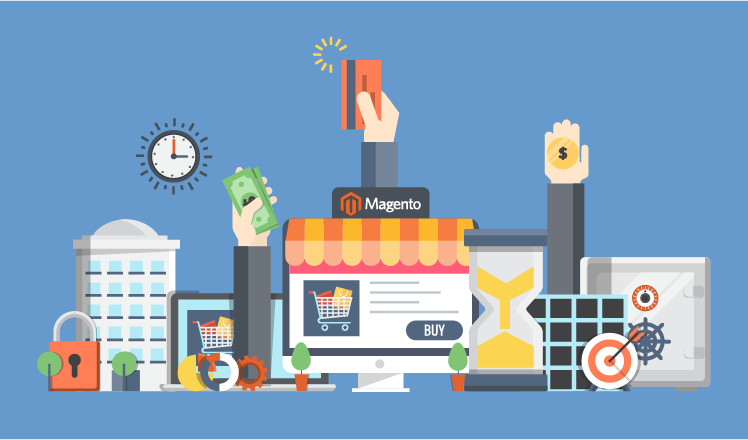Magento payment gateways and their role in ecommerce
Just like in a school math problem, an online payment goes from point A, a checkout page in a Magento online store, to point B, a merchant’s banking account. How much time does this journey take? And what intermediaries does the payment encounter along the way?
While talking about an online payment process, we come across the idea of a Magento payment gateway. A virtual intermediary between a customer, a bank and a merchant, it is responsible for the whole process of payment data transfer. By encrypting personal information of customers, it prevents identity theft and phishing.
We understand that retailers might have a lot of questions concerning such a sensitive aspect as payment. We will try to cover the key ones related to payment gateways.

How does a Magento payment gateway work?
We’ve got used to instant payment processing. Having pressed a Submit button, we get the result in seconds. It may seem that a payment page connects directly to the corresponding bank but in fact, the payment way is more complicated. Let’s clear it up and find out the role of default Magento gateways in this process.
- Once a customer triggers a payment process, a Magento payment gateway captures the transaction request, encrypts the payment information and transfers it to a payment processor.
- The payment processor sends the transaction data to the acquiring bank (or PayPal if this method is used) that assesses the request from funds availability and fraud perspectives. It decides whether to authorize the transaction or not.
- The response goes the same way back. The payment gateway completes the payment process by transferring the answer to the customer.
Along with the role of payment information intermediary, a Magento payment gateway can enhance the credibility and standing of an online store.
How to choose a Magento payment gateway
Payment is a sensitive process as customers provide access to their bank accounts. Shattered once, their trust would be very difficult to restore. Expert Magento consultants would agree that a Magento payment gateway can both help and harm. Prior to scrutinizing a Magento payment gateway list and making a choice, it is rational to consider the following questions.
- Does a payment gateway add to an excellent customer experience? The gateways contribute greatly to customer retention and loyalty development. The gateway you choose should comply with the high level of your services and enable appealing user interface. Such features as smooth mobile check-out or payment information autofill will enhance your customer checkout experience.
- How accessible is the gateway? Payment gateways that support multiple locations and currencies are required for online stores with international delivery and for steady growing businesses.
- Does a payment gateway protect from false declines? Up to 20% of cross-border transactions are declined as they are seen as more vulnerable to fraud. International acquiring partnerships allow payment gateways to smoothly connect to foreign banks.
- Does a Magento out-of-the-box payment gateway fully meet your business needs? There are payment gateways that Magento offers by default. Still, it may be rational to go beyond the out-of-the-box functionality. Custom payment gateways include Amazon Payment, iPay, Dwolla, Stripe, Adyen, etc. As Magento lacks some payment methods like e-wallets and pre-paid cards, custom integration may be required. Paymaster24, a multi-channel payment gateway, supports credit and debit cards, online and offline bank transfers, e-wallets and pre-paid cards to ensure that customers can choose among various payment methods.
Top Magento payment gateways and what they offer
Choosing the best payment gateway for Magento, an online store owner should start from business needs, target audience and gateway capabilities.
Out-of-the-box Magento payment methods are integrated with the following external payment gateways:
- Worldwide: PayPal, Authorize.Net, CyberSource, First Data, WorldPay.
- North America: PSiGate, Braintree.
- Europe: DIBS Payment Services, Ogone, Paybox Direct, PAYONE.de, Sage Pay Direct.
- Oceania: eWAY Direct.
Let’s compare the top 3 of Magento payment gateways in terms of their functionality and security and see which reputed companies use them. We don’t emphasize pricing as it is the same for all three gateways - 2.9% + $0.30 per transaction.
PayPal
The most well-known name in the list, PayPal made the total payment volume of more than $354 billion in 2016, which is 26% more than in 2015. PayPal is available in 200+ countries and supports 25 currencies.
- Functionality. PayPal offers a secure and instant way to purchase. Having created a PayPal account and added cards to it, customers complete the checkout process with email confirmation. Their personal information is not revealed while paying.
- Security. PayPal offers advanced encryption and 24/7 fraud detection monitoring.
- Customers. Walmart, eBay, Overstock, Dell, FTD Flowers.
Braintree
Owned by PayPal, Braintree caters to both small and large businesses. It is available in 44 countries and supports 130+ currencies.
- Functionality. Online store owners can choose either an off-the-shelf or a custom checkout UI to better meet their business ideas. Braintree offers a one-click checkout process and different ways to pay including Apple pay, Venmo, Bitcoin, PayPal and Android Pay.
- Security. The basic fraud protection is guaranteed with CVV verification and Risk Threshold. Kount Standard, Kount Custom and 3D secure provide the advanced fraud protection.
- Customers. Airbnb, Uber, Marketplacer, Bonobos and Casper.
Authorize.Net
Since its launch in 1996, Authorize.Net has expanded to 440,000+ merchants around the world offering its services in 35 countries and in 13 currencies.
- Functionality. Customers can save the credit card data with the Authorize.Net Customer Information Manager function. Apart from a credit card, the payment can be conducted via e-check, Apple Pay, PayPal, and Visa Checkout. There’s also a free mobile app.
- Security. The data is protected with the Advanced Fraud Detection Suite and such security measures as address and CVV verification.
- Customers. Button Makers, Fresh, PressReady Marketing and Thos. Baker.
A single payment gateway is not a threshold
The emerging ecommerce market necessitates ever-evolving businesses. Online entrepreneurs don’t have to limit themselves and can add several default Magento payment gateways or use custom modules to target specific needs. The reasons for two or more payment gateways boil down to three fundamental points.
- Business expansion. Entering the international market implies working with different banks and currencies. As an ecommerce company grows, more target markets are to be covered.
- Backup. Customers don’t want to encounter any malfunctions while navigating an online store, not to mention a sensitive payment process. Running several payment gateways is a good practice of backing up an online store. The cost of additional gateways is justified when the primary one is underperforming or at peak times.
- Customer choice. An owner chooses a payment gateway for his or her online store. The choice is not always consistent with what customers would choose. Offering several options means more chances to meet customer needs.
For example, ride-hailing service Lyft uses Stripe for most transaction, but it also has added Braintree for those who want to charge a purchase to a PayPal account.
Refund as a part of customer-oriented service
An ecommerce transaction is a credibility test between a merchant and customers. A possibility to try on, feel the material, see real colors is postponed until the delivery. Offering a refund you please a customer by being on his or her side. Magento allows for flexibility of return’s policy to cater to each specific customer’s situation. Along with the item refund, it is possible to compensate the shipping, offer an extra bonus to settle a conflict or subtract a part from the total amount refunded.
In Magento, a credit memo is created to make a refund. This document contains all the order details: account information, billing and shipping addresses and ordered items.
There are two options for a Magento refund: online refund and refund to store credit. Online refund implies the transfer of the funds to the credit card or PayPal account. Store credits are the funds stored in the customer’s account for future purchases.
For the finale
Let’s once again stress the importance of a flawless payment process in ecommerce. A failure during this final step towards a purchase is inexcusable. The choice of Magento payment gateways should be in focus while launching an online store. It is vital to take into account gateway’s functional capabilities, fees, fraud prevention means, currencies and countries supported. We shouldn’t forget business specifics and goals as well since they affect the whole process of Magento development.


